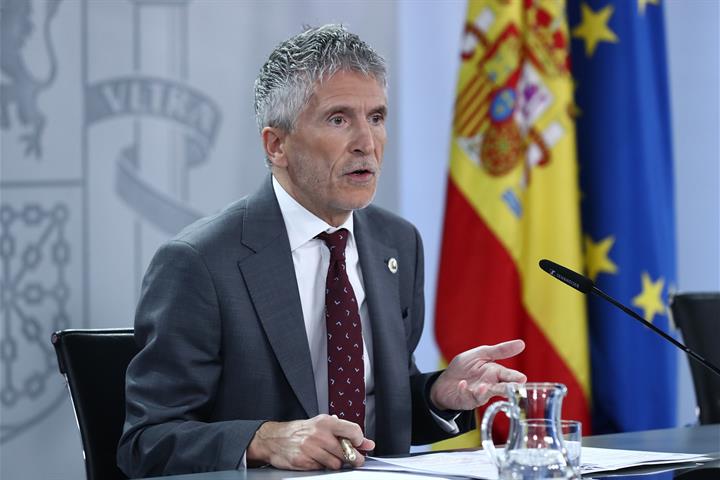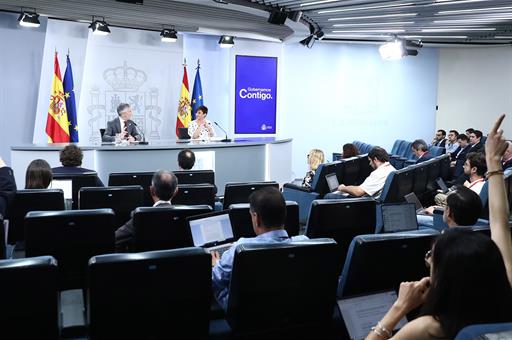Council of Ministers
The Council of Ministers approves the forest fire prevention and control plan for 2023
Council of Ministers - 2023.6.20
Moncloa Palace, Madrid
The Minister for Territorial Policy and Government Spokesperson, Isabel Rodríguez, and the Minister for Home Affairs, Fernando Grande-Marlaska, at the press conference following the Council of Ministers. Moncloa Pool / Fernando Calvo. Moncloa Palace, Madrid 20.6.2023
The Executive has approved the action plan aimed at preventing and combating forest fires during this summer and the rest of the year. The aim, according to the Minister for Home Affairs, Fernando Grande-Marlaska, is to "provide all necessary means" to "protect citizens, their lives and their property".
Grande-Marlaska has framed this plan within one of the Government's priorities, the fight against climate change and its consequences: "We are no longer talking about estimates or predictive models, we are talking about a reality that has demonstrated its terrible destructive potential on our towns, fields, cities, livestock and agricultural holdings and on the natural heritage of the different regions of Spain".
The Home Affairs Minister recalled that more than 300,000 hectares of forest area burned in Spain in 2022, the number of large fires tripled the average for the last 10 years, the State Law Enforcement Forces and Agencies had to evacuate more than 30,000 residents "and, worst of all, four people lost their lives".
State forest fire-fighting system
To adapt to the new climate change scenario, the Executive brought forward the launch of the start of the campaign against forest fires to 28 April. Since that day, almost two months before the usual date, the State Coordination and Steering Committee has been managing all the resources of the General State Administration in this area. The minister pointed out that, although the main competences correspond to the regional governments, "the Government is fully involved and, together with the provinces and local authorities, we are working hand in glove to deal with this emergency".
For this campaign, the Executive has put in place a system involving the forest fire reinforcement brigades and the fleet of large-capacity seaplanes of the Ministry of Ecological Transition and Demographic Challenge, which is operated by the 43rd Air and Space Force Group. It is also made up of the Ministry of Defence's Military Emergency Unit, the Directorate General of Traffic, which manages the control of the roads affected by the fires and the accesses to nearby towns, and the State Law Enforcement Forces and Agencies.
 The Minister for Home Affairs, Fernando Grande-Marlaska, during his speech at the press conference after the Council of Ministers | Pool Moncloa / Fernando Calvo
The Minister for Home Affairs, Fernando Grande-Marlaska, during his speech at the press conference after the Council of Ministers | Pool Moncloa / Fernando Calvo
Fernando Grande-Marlaska pointed out that the National Police are already actively participating in the plans against forest fires in force in Andalusia, Aragon, the Canary Islands, Castilla-La Mancha, Castilla y Leon, Galicia, Navarre and the Valencian Community. For its part, the Guardia Civil carries out forest fire prevention, surveillance and warning tasks throughout the year. Agents of the Guardia Civil's Nature Protection Service (Seprona) are also in charge of the investigation to determine the origin of the fires and bring those responsible to justice: in 2022, the Guardia Civil concluded that 584 fires had been intentionally set and the corresponding arrests were made.
Improved coherence of Civil Protection plans
The Minister for Home Affairs stressed that all these forest fire-fighting resources are integrated into the National Civil Protection System, "a key element in the response to disasters and emergencies". In order to improve it further, the Council of Ministers has updated the Basic Civil Protection Regulations, which had not been amended since their approval in 1992.
Grande-Marlaska stated that this is the second most important regulatory instrument of the National System because it ensures the coherence of all the sectoral and territorial Civil Protection plans and their correspondence with the General State Plan for Civil Protection Emergencies. The text includes the general criteria for the minimum content of the plans, the basic guidelines for identifying emergency risks and the necessary actions for their management through coherent and homogeneous planning.
Risks to be covered by specific plans include floods, earthquakes, tsunamis, volcanic risks, adverse weather events, forest fires, accidents in facilities with chemical, biological, nuclear or radioactive substances, civil aviation accidents, accidents involving the transport of dangerous goods and protection of the population in the event of armed conflict.
Aid for those affected by emergencies
 The Minister for Home Affairs, Fernando Grande-Marlaska, at the press conference after the Council of Ministers | Pool Moncloa / Fernando Calvo
The Minister for Home Affairs, Fernando Grande-Marlaska, at the press conference after the Council of Ministers | Pool Moncloa / Fernando Calvo
Also related to Home Affairs, the Council of Ministers has declared the territories of all the autonomous communities which, from 20 August to 8 June this year, have suffered forest fires, floods, snowfalls and other emergencies caused by phenomena of different natures as areas seriously affected by a Civil Protection emergency.
A total of 80 such events occurred in Andalusia, Aragon, Asturias, the Canary Islands, Castilla y Leon, Castilla-La Mancha, the Valencian Community, Extremadura, Galicia, the Balearic Islands, Murcia, Navarre and the Basque Country, as well as in the autonomous city of Ceuta.
With this declaration, aid may be claimed by those who have suffered personal injury or damage to basic necessities, those who have lost their homes or suffered structural damage, those who have suffered damage to industrial, commercial and service establishments - including agricultural, maritime-fishing and tourist establishments - and also by local corporations that have had to face expenses derived from actions that cannot be postponed in order to recover public services.
Specific plans for the summer
For the summer period, which begins on 21 June, the Council of Ministers has approved a set of action plans with specific measures to act in a coordinated manner among all departments and also with other administrations.
 The Government Spokesperson and Minister for Territorial Policy, Isabel Rodríguez, during her speech at the press conference after the Council of Ministers | Pool Moncloa / Fernando Calvo
The Government Spokesperson and Minister for Territorial Policy, Isabel Rodríguez, during her speech at the press conference after the Council of Ministers | Pool Moncloa / Fernando Calvo
The Minister for Territorial Policy and Government Spokesperson, Isabel Rodríguez, highlighted the initiatives related to public safety; road and air travel; 'Operation Crossing the Strait'; health protection, with special attention to the elderly, and assistance for Spaniards travelling abroad.
This set of plans includes the National Plan of Preventive Actions on the Effects of Excess Temperatures on Health.
Support for the Ryder Cup in 2031
The Government has backed the candidacy presented by the Royal Spanish Golf Federation to host the 48th Ryder Cup in 2031, with Catalonia as the host region.
The Executive's spokesperson pointed out that this championship is one of the sporting events that arouses most interest, only behind the Olympic Games and the Football World Cup, and that golf attracts 1.2 million tourists to Spain every year. She also recalled that in 1997 it was held in the Campo de Gibraltar and brought "major economic benefits to the area".
The Government's commitment consists of a series of guarantees to the championship's organisers to facilitate everything from visas and authorisations to the most efficient infrastructures for holding the tournament.
Investments in National Heritage and infrastructure
 The Government Spokesperson and Minister for Territorial Policy, Isabel Rodríguez, and the Minister for Home Affairs, Fernando Grande-Marlaska, at the press conference after the Council of Ministers | Pool Moncloa / Fernando Calvo
The Government Spokesperson and Minister for Territorial Policy, Isabel Rodríguez, and the Minister for Home Affairs, Fernando Grande-Marlaska, at the press conference after the Council of Ministers | Pool Moncloa / Fernando Calvo
The Council of Ministers has earmarked 14.7 million euros to refurbish National Heritage buildings in the Community of Madrid and Castilla y León.
In the first case, the new areas of the visitors' reception centre at the Royal Palace in Madrid will be adapted and the old pharmacy will be refurbished, at a cost of 4.5 million euros; the visitors' reception centre at the Descalzas Reales Monastery will be improved, with a budget of 350,000 euros, and landscaping work will be carried out in the Parterre Garden and the fountains at the Royal Site of Aranjuez will be restored, with an investment of 5 million euros.
In Castilla y León, 1.7 million euros is earmarked to restore the cloister of the Evangelists at the El Escorial Monastery and 3 million euros to refurbish the visitors' reception centre and the Tapestry Museum at the Royal Palace of La Granja.
In addition, the Executive has earmarked 59 million euros for infrastructure, including 13.9 million euros to remodel the Puertollano high-speed train station (Ciudad Real).
Non official translation





